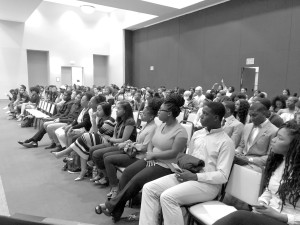After 2016, HBCU students see importance of voting
17th September 2018 · 0 Comments
By Amyre Brandom-Skinner
Contributing Writer
They showed up in record numbers for President Barack Obama. But a national study showed voter turnout fell 10 percent by college students at historically Black colleges and universities during the 2016 presidential election.
In the 2017 Tufts University study on voter participation, HBCU student voting dropped from 50.5 percent to 39.9 percent from 2012 to 2016. While voting in states like Florida and Georgia remained relatively consistent, voting in the South experienced the deepest drops.
“With Constitution Day coming, we want to host webinars for students to get a better understanding of what is at stake,” said Pamela Waldron-Moore, professor and head of the department at political science at Xavier University about activities scheduled on campus on Sept. 17. “There will be two national professors conducting a webinar with a real-world exchange intended to help students gain a greater understanding of politics in the United States.”

Xavier students taking their power of the vote seriously as they attend a debate forum the University’s annual student government elections.
While students say they understand the importance of voting, they acknowledged they lack some of the specifics needed to make an educated choice.
“If students do not understand those basic things [gerrymandering and electoral college], then the real value of their vote does not matter,” Moore added.
Midterm elections often experience a dip in voter turnout than cycles with presidential elections. But despite the drop in turnout in 2016, HBCU students say they now understand the consequences of not voting, and the impact they can make if they show up for races on Nov. 6.
“It’s good to have numerous opinions around the table, every voice matters,” said Bryce Watson, a freshman from Glendale, Md. “There is always room for improvement in the United States. Expressing the right to vote is our only option at this point.”
One of the missions of HBCUs is to educate minority students about the value of the vote. Students say they are reminded there was a time when no one that looked like them could cast a vote.
“Our ancestors fought for our right to vote, so we have to show up and show out for them,” said Mekhi Prince, a sophomore from Memphis, Tenn. “We have to make sure that they didn’t do it in vain.”
The 2016 election results have shown them what can happen if they don’t vote, some students said. They acknowledged now that they are to play a more active role when it comes to voting. They say they are energized and excited to show up to the polls for the midterm this fall.
“I voted because I knew that was the way to keep Trump out of office,” said Tyra Smith, a senior from Detroit, Mich. “If you do not show up to the polls to vote, you are still casting a vote [of silence] that you do not care.”
Although the study noted that voter drive groups tried to reach millennials with apps like TurboVote, students say they felt disconnected from some campaigns.
“To bring more millennials to the polls, more exploratory committees should have been used to engage us, a very crucial aspect of the campaign that was left out,” said Edward Wiggins, a junior from Clinton, Miss. “I want to vote to effect positive change in my community as much as possible,” Wiggins said.
Other students said they did not show up to the polls because they believe that their voice is not being heard by politicians.
“Although we are the future, I don’t think they really care about us, our vote, or our voice,” said Myeesha Jeter, a first-year pharmacy student from Memphis, Tenn. “Politicians do not make any effort to reach out to us [millennials]. We are constantly stressing political issues but there is no change being made.”
The study noted that campus climates play a role in a student’s decision whether or not to vote or be politically engaged. Students say they recognize now that after 2016, the time to express theirs concerns is during elections when the power to make change is through their vote.
“Showing up to vote on November 6 is not a choice for me,” Prince said.
This article originally published in the September 17, 2018 print edition of The Louisiana Weekly newspaper.



